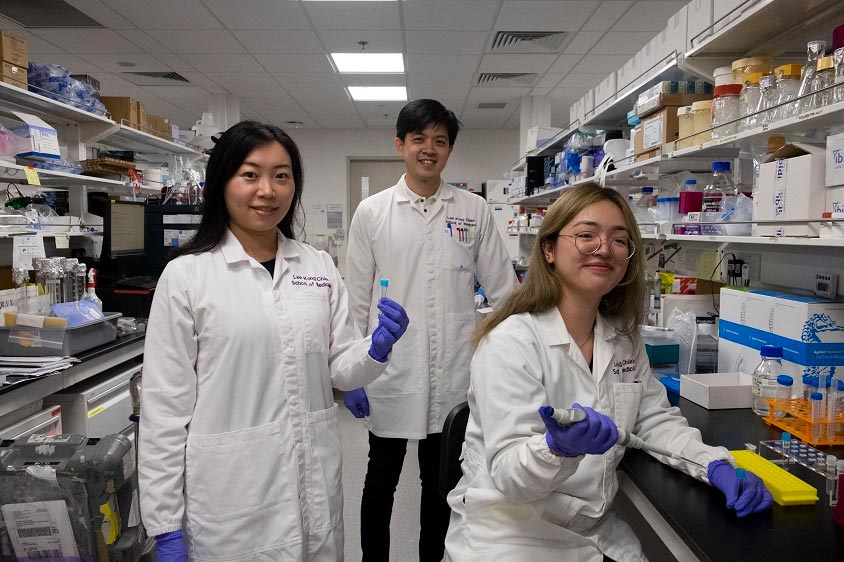Investigators Link COVID-19 and Risk of Blood Clot Formation
0 View
Share this Video
- Publish Date:
- 18 April, 2021
- Category:
- Covid
- Video License
- Standard License
- Imported From:
- Youtube
Tags

(Left to right.) Assistant Professor Christine Cheung, Research Associate Dr. Wu Kanxing, and Research Assistant Florence Chioh, NTU Lee Kong Chian School of Medicine. Credit: NTU
According to a study led by scientists at Nanyang Technological University, Singapore (NTU), people who have recovered from COVID-19, especially those with pre-existing cardiovascular disease, are at risk of developing blood clots due to a persistent and overactive immune response . .
The team of researchers, led by NTU assistant professor Christine Cheung, explored the possible link between COVID-19 and an increased risk of blood clots, and shed new light on “ long-term COVID ” – the name given to the medium and long term. long-term health consequences of COVID-19.
The findings may help explain why some people who have recovered from COVID-19 show symptoms of blood clotting complications after their initial recovery. In some cases, they are at an increased risk of heart attack, stroke, or organ failure when blood clots block large arteries to vital organs.
The team, consisting of researchers from NTU, Agency for Science, Technology and Research’s (A * STAR) Singapore Immunology Network (SIgN), and the National Center of Infectious Diseases, Singapore (NCID), collected and analyzed blood samples from 30 COVID-19 patients one month after they recovered from the infection and were discharged from the hospital. They found that all recovered COVID-19 patients showed signs of blood vessel damage, possibly due to a sustained immune response, which can cause blood clots to form.
Their findings were published March 23, 2021 in the peer-reviewed scientific journal eLife.
“With more people recovering from COVID-19, we began to hear from clinicians that patients came back with blood clotting problems after being discharged and cleared of the virus,” said Asst Prof Christine Cheung of NTU’s Lee Kong Chian School of Medicine. “This makes a strong case for closely monitoring recovered COVID-19 patients, especially those with pre-existing cardiovascular conditions such as hypertension and diabetes who have weakened blood vessels.”
Blood vessel damage due to an overactive immune system after recovery
The team found that recovered COVID-19 patients had twice the normal number of circulating endothelial cells (CECs) shed by damaged blood vessel walls. The increased levels of CECs indicate that blood vessel injury is still visible after recovery from viral infection.
The researchers also found that recovered COVID-19 patients continued to produce high levels of cytokines – proteins produced by immune cells that activate the immune response against pathogens – even in the absence of the virus.
Unusually high numbers of immune cells, known as T cells, that attack and destroy viruses were also present in the blood of recovered COVID-19 patients.
The presence of both cytokines and higher levels of immune cells suggests that the immune systems of recovered COVID-19 patients remained activated even after the virus cleared.
The researchers hypothesize that these persistently activated immune responses could attack the blood vessels of recovered COVID-19 patients, cause even more damage and further increase the risk of blood clots forming.
The study’s lead author, Florence Chioh, a research assistant at NTU’s Lee Kong Chian School of Medicine, said, “Although COVID-19 is primarily a respiratory tract infection, the virus can also affect the lining of blood vessels and cause inflammation and damage. Leakage from these damaged blood vessels causes blood clots to form that can result in the kind of complications that patients see during hospitalization. “
One of the paper’s co-authors, Professor Lisa Ng, executive director of A * STAR Infectious Diseases Labs and formerly Senior Principal Investigator at SIgN, said activated T lymphocyte-associated cytokines that persist from infection to recovery phase. This correlated positively with CEC measurement, indicating cytokine-driven vascular damage. We found that COVID-19 patients with vascular complications have a higher frequency of T cells, which in turn can attack blood vessels. Preventive therapy may be required for these patients. “
Emphasis on care after hospitalization for COVID-19 patients at risk
The main findings of the study could help establish guidelines for post-hospitalization care of COVID-19 patients who may be prone to “ long-term COVID ” symptoms, the research team said.
In January of this year, the World Health Organization (WHO) issued a recommendation in their revised clinical management guidelines, focusing on the risk of blood clots forming. For hospital patients, the WHO recommended the use of low-dose anticoagulants to prevent blood clots from forming in blood vessels.
Dr. Cheung added, “People with cardiovascular disease need to be more careful as their underlying conditions are already weakening their vascular system. It’s a double shot with COVID-19. As we gain a better understanding of the complications facing COVID ‘long haulers’, there is hope that vaccine uptake will be stimulated to protect itself against both the virus and its long-term complications. “
Looking ahead, the team is investigating the long-term effects of COVID-19 in patients who have recovered from the infection for at least six months or more.
Reference: “Convalescent COVID-19 Patients Are Prone to Endothelial Dysfunction Due to Sustained Immune Activation” by Florence WJ Chioh, Siew-Wai Fong, Barnaby E Young, Kan-Xing Wu, Anthony Siau, Shuba Krishnan, Yi-Hao Chan, Guillaume Carissimo, Louis LY Teo, Fei Gao, Ru San Tan, Liang Zhong, Angela S Koh, Seow-Yen Tan, Paul A Tambyah, Laurent Renia, Lisa FP Ng, David C Lye and Christine Cheung, March 23, 2021, eLife.
DOI: 10.7554 / eLife.64909










